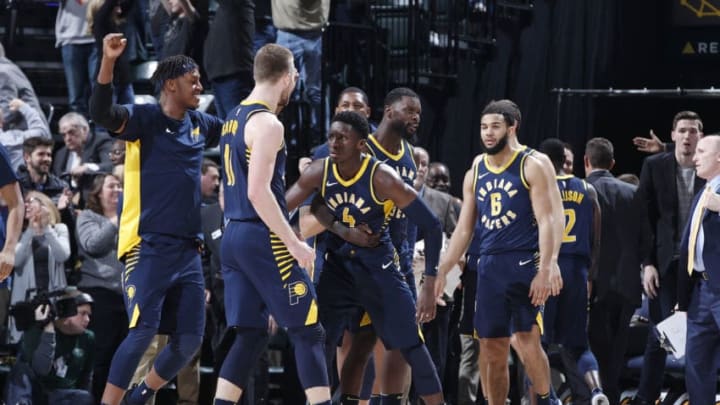While the NBA Trade deadline arrived and passed, the Indiana Pacers shrugged and kept their roster intact.
Over a three-hour stretch on Thursday afternoon, Woj Bombs pummeled the NBA Landscape, 36 players from 22 teams were exchanged. Some were extremely famous (Dwyane Wade was returned to the Heat), some were extremely obscure (the rights to Milovan Rakovic were bequeathed to Portland), none were Indiana Pacers.
No trades for Indiana.
This doesn’t mean that Indiana wasn’t involved in talks. There were reports that Indiana was open to using its cap space to absorb a bad contract from another team, as long as that team included a first round pick for the Pacers’ troubles. It didn’t happen.
Indiana has been aggressive in offering its salary space to extract a first-round pick for absorbing a bad contract, league sources tell ESPN. Pacers would send Al Jefferson back in those deals.
— Adrian Wojnarowski (@wojespn) February 8, 2018
There were other reports that the Nets might be interested in unloading DeMarre Carroll and that the Pacers could have been a fitting landing spot. The issue was that Brooklyn wanted to receive a first-round pick as part of the deal, exactly what Indiana wanted. That significant impasse proved insurmountable.
One trade deadline possibility, I'm told, would send Brooklyn's DeMarre Carroll to Indiana for Al Jefferson. As @JeffZillgitt noted, Carroll causing chatter today. He's owed $15.4 million next season (Jefferson has $10 million team option).
— Sam Amick (@sam_amick) February 8, 2018
Just before the deadline, Wojnarowski tweeted that Denver had been in conversations with Indiana as they tried to move Kenneth Faried. Again Indiana didn’t pull the trigger.
Sources: There's still hope within Kenneth Faried's camp that Denver will find a trade for Kenneth Faried and allow him a fresh start elsewhere. Denver has been talking to teams -- including Indiana -- but those haven't resulted in a deal.
— Adrian Wojnarowski (@wojespn) February 8, 2018
While it is far sexier to have one’s name chatted up, the most well-run teams (i.e. the Celtics, Spurs and now Warriors) rarely accept trades that don’t clearly benefit them, and, when necessary, they’re comfortable walking away without making a deal rather than pulling the trigger on one that they are uncomfortable with. Such, apparently, was Indiana’s approach to this deadline.
In theory, adding Carroll and Faried wouldn’t have hurt the cap sheet all that much. Each had a guaranteed year left on their current deals (Carroll $15.4M and Faried $13.8M) Indiana could have absorbed them. Could have, but now the Pacers don’t have to. Instead, they can maintain the flexibility that Al Jefferson’s mostly non-guaranteed contract affords them headed into the offseason.
While prudence has saved Indiana from taking on any extra contracts, it also hasn’t improved the team. The Pacers’ aren’t likely to all-of-a-sudden figure out how to look competent when Victor Oladipo is absent, nor did Indiana find any help to improve its atrocious rebounding (currently 25th in the NBA).
More from 8 Points, 9 Seconds
- 2 Studs, 1 dud from gut-wrenching Indiana Pacers loss to Charlotte Hornets
- Handing out early-season grades for Pacers’ Bruce Brown, Obi Toppin
- 3 positives, 2 negatives in Pacers In-Season Tournament win vs. Cavaliers
- 2 positives, 3 negatives from first week of Indiana Pacers basketball
- Should Isaiah Jackson’s days with Indiana Pacers be numbered?
But there might still be avenues to improve at least the latter inadequacy. Several teams were already gearing up for a robust post-trade free agent market. Maybe Indiana could use it’s current cap space and open roster spot to land rebounding help. While there’s no indication that that will happen, it’s not a complete pipedream either.
Two players (Utah Jazz guard Derrick Rose and Sacramento Kings center Georgios Papagiannis) will soon be released or have been released. More are likely to follow. Indiana can still find a player that they could sign for the remainder of the season.
The Pacers’ weren’t the only team to pass on the deadline. Boston, Golden State, Houston, Minnesota, Oklahoma City, Philadelphia and San Antonio (all playoff teams), all sat out as well.
So while the Cavaliers frantically changed its roster over (four new players: Jordan Clarkson, George Hill, Rodney Hood and Larry Nance Jr. replaced six outgoing ones: Jae Crowder, Channing Frye, Rose, Iman Shumpert, Isaiah Thomas and Wade), several other good teams decided not to.
Next: SF Wednesdays: Bojan on the curl
The question of which approach was better (prudence or boldness) will be settled in the months ahead
